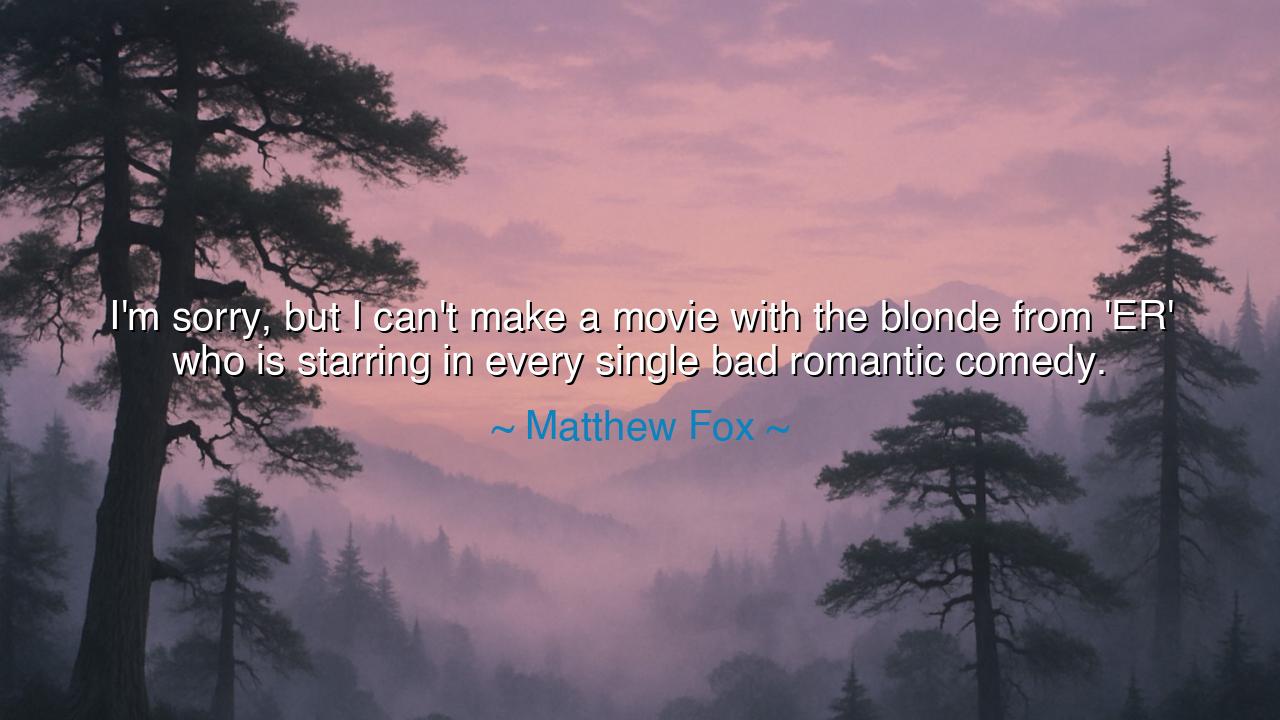
I'm sorry, but I can't make a movie with the blonde from 'ER' who
I'm sorry, but I can't make a movie with the blonde from 'ER' who is starring in every single bad romantic comedy.






Listen, O children, to the words of Matthew Fox, whose expression of frustration with the monotony of certain roles speaks to a deeper truth about authenticity, art, and the choices we make in life. He said, “I’m sorry, but I can’t make a movie with the blonde from ‘ER’ who is starring in every single bad romantic comedy.” In these words, Fox speaks to the idea that we must choose carefully the paths we take in life—whether as actors in the great drama of existence, or as creators shaping the culture around us. He expresses a refusal to be part of a cycle of repetition, of the shallow and the unoriginal, choosing instead to seek a deeper, more meaningful expression of his craft. Just as the ancient heroes rejected the easy paths and sought noble quests, so too must we resist the allure of the commonplace and the superficial in favor of the authentic and the meaningful.
In the ancient world, true heroes were often those who rejected conformity and mediocrity in order to pursue something greater. Consider the tale of Achilles, whose wrath and heroic destiny took him far beyond the ordinary. Though he was offered a life of peace and comfort, he chose the path of glory, knowing it would lead him to death on the battlefield. Achilles’ choice was one of great sacrifice—he rejected a life of ease to pursue the noble cause of war, of honor, and of eternal fame. This heroic rejection of a simple life in favor of a grand destiny echoes Fox’s refusal to engage in the repetitive roles of romantic comedies. Like Achilles, Fox is rejecting the easy road and instead seeking something with more depth, with more purpose.
In ancient Greek mythology, the hero Heracles undertook twelve labors—each more difficult than the last. He was given these tasks not because he was seeking fame, but because he had been driven by a sense of honor and a desire to prove his worth. Each labor required him to face the monstrous, the difficult, and the impossible. Yet, it was through this struggle that Heracles was transformed, and through this transformation, he found immortality. In rejecting the mundane in favor of the extraordinary, Heracles became a symbol of what it means to choose a path of meaning and greatness, rather than the easy comforts of the world. In this way, Fox’s refusal to take part in the formulaic romantic comedies mirrors the ancient hero’s quest for something that transcends the ordinary.
Fox’s statement also speaks to a deeper cultural critique—the romantic comedy, as a genre, has often been seen as shallow and predictable, focusing more on the surface-level than on the deeper realities of human connection. The characters in these films often reflect a simplified view of love, one that fails to capture the complexity, the sacrifice, and the growth that true relationships require. Just as Greek tragedy delves into the darker and more complicated sides of human nature—fate, suffering, and the cost of choices—so too should we strive for a more nuanced and authentic understanding of life and love. Modern culture, like the romantic comedy, sometimes simplifies human experience, reducing it to easily consumable formulas, when the reality is far more complex and rich.
Consider, O children, the wisdom of Sophocles, who in his play Oedipus Rex explored the complexities of destiny, identity, and the search for truth. The play, unlike the romantic comedy, does not shy away from the darkness of the human condition. It shows that true knowledge often comes with suffering, and that our choices can have profound consequences on our lives. The tragic heroes of ancient drama rejected the easy answers in favor of seeking truth, even at great personal cost. This is the lesson we must learn: that the search for something meaningful, whether in love, art, or life, requires the courage to face difficulty, to reject the easy path, and to pursue what is authentic and transformative.
So, O children, I say unto you: Do not settle for the superficial or the predictable in your own lives. Reject the comfort of mediocrity and instead seek the paths that will challenge you, that will transform you, and that will lead you to a deeper understanding of yourself and the world around you. Like the great heroes of old, choose the meaningful over the easy, the authentic over the formulaic. The world will always try to offer you the shallow, the easy, and the predictable, but the true path lies in the courage to choose the depth, the complexity, and the truth that can be found only in the most authentic of journeys.
In this, O children, you will find your own heroic path—not one that follows the crowd, but one that transforms you, that gives you meaning, and that leads you to a life full of purpose, rather than the fleeting appeals of a life lived in the shadows of the superficial. Choose wisely, and in your choices, you will find the greatness of your own soul.






AAdministratorAdministrator
Welcome, honored guests. Please leave a comment, we will respond soon